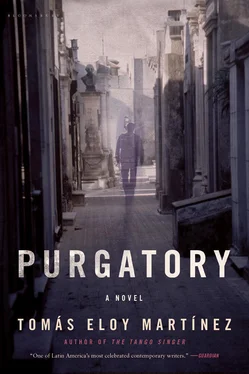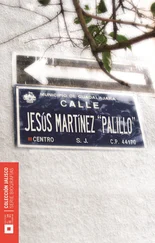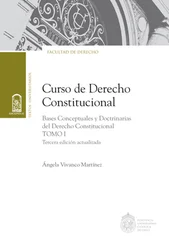Emilia arrived at the gala like Cinderella in her fairy coach. Her mother’s earrings lit up her face with a radiance that seemed to come from another body (she knew from where). Even the Eel came up to greet her, surprised. ‘ M’hijita , how pretty you look.’ He was wearing a full dress uniform bedecked with medals. Dupuy shook the Eel’s hand, bowed to his wife — who was wearing a long blue dress to cover her bloated legs. There was a flight of marble steps up to the main hall. Reality had been left outside with the few families of beggars who scavenged for food in the garbage. The great hall, where a quarter of a century earlier Evita had received the destitute, was a copy of the Grand Hall in the Paris Opera House, the ceiling and the pillars extravagantly and ornately gilded. Inside, the hall was lined with mirrors which endlessly reflected the chandeliers, the jewels, the huge platters of lobster and caviar. Emilia had nightmares about mirrors. Her mother’s dressing room had floor-length mirrors, even mirrors on the ceiling. As a little girl Ethel had threatened to lock her in there and ever since she had not been able to shake off the nightmare of being hundreds of Emilias, endlessly reflected, none of them the same, because no reflection was exactly like another. She spotted Caccace in the distance running after a large platter of quails’ eggs and popping two and three into his mouth at a time. From time to time he took out a little pad and made notes. The king and queen had not yet arrived, but they were clearly due at any moment because the crowd, forgetting protocol, were elbowing each other at the top of the stairs behind the Eel. Emilia decided to stay at the back of the room near the window where Juan Manuel Fangio, a former racing-car driver, was trying to avoid the stifling heat. Emilia too was beginning to feel suffocated and she draped her cape on a chair between two curtains. She heard applause and moved closer so she could get a glimpse of the king and queen, who looked very young and very happy. The king was wearing a dinner jacket just like everyone else. Next to him, the queen looked tiny. Emilia stopped, incredulous when she saw the dress she was wearing. She had read somewhere that the queen only wore Spanish couture, designs specially made for her by Balenciaga and his disciples. But the dress she was wearing that evening was almost a perfect copy of Emilia’s dress. D always insisted that she had very little talent. ‘What I do is really simple,’ she’d say, ‘it’s nothing much.’ And here was the queen wearing a dress that looked just like the one made by her dressmaker but which had probably cost a hundred times more. It was the same design, subtly tailored with dusky pink trimming about the waist, broad shoulder straps and the same square neckline that Emilia had found so intimidating. The only difference was the colour; the queen’s dress was white. The designer at Balenciaga or whoever it was had also given the queen a matching cape: dusky pink crêpe tied with an almost invisible red cord. Emilia didn’t know where to put herself; she was terrified the queen would notice the coincidence. She felt embarrassed and ashamed, but at the same time proud of her dressmaker. She was relieved that she had taken off her cape. She watched as the queen, hemmed in by the crowd, fanned herself impatiently, never once losing her smile.
The waiters glided from one group to the next carrying silver salvers which were picked clean within seconds. Caccace came over to Emilia, prattling incessantly. He explained to her who was who, how the room they were in was modelled on the Second Empire architectural style. He went on and on. The queen too seemed to be suffering from all the hand-kissing, the cigar smoke, the terrible humidity, the stultifying heat. She walked towards one of the windows to get some air, taking off her cape and handing it to one of her ladies-in-waiting.
The Eel’s wife was sweating profusely. She came over to Emilia, gasping for breath, weighed down by her swollen legs. ‘That’s a beautiful dress you’re wearing,’ she said, ‘but you really should take your dressmaker to task for copying the queen’s dress. He’s French, isn’t he? An Argentinian would have made something more fitting.’ Caccace took a step forward, but just as he was about to kiss her hand and introduce himself, she took a step back. The Eel’s wife stumbled and apologised. ‘Excuse me, how embarrassing, I think I might faint.’ Emilia gestured almost imperceptibly to one of the waiters and together they led her to a chair. Caccace trotted after them, still prattling, still making notes in his little pad. Emilia whispered something in her father’s ear as he passed; Dupuy urgently summoned the Eel’s personal physician, who within ten seconds had unobtrusively taken her pulse and given her some water to drink. He stayed with her until she got her breath back. Everything happened so quickly that nobody seemed to have noticed and perhaps nobody would have known had Caccace not tactlessly reported it in the admiral’s newspaper. Dupuy indignantly phoned the editor and demanded that he immediately fire that childish chimpanzee. Those were his very words; he was proud of his little alliteration.
The king and queen stayed another two hours at the party without anything else worthy of note happening. Just one trivial episode, which went unnoticed, proved the beginning of a secret scandal. On her way back from the toilet one of the queen’s ladies-in-waiting stopped, her back turned, to smooth the creases from her skirt and her blouse, and in doing so exposed a glimpse of her hip as she stepped into the hall. Her skin was very pale and above the iliac crest there was an all too obvious, alluring beauty mark. The lady-in-waiting was pretty and also flirtatious. One of the admiral’s bodyguards glanced over and smiled at her lasciviously. She returned his smile. This was enough for the guard, in a white dress uniform, to approach her and make a proposition. The lady-in-waiting let out a peal of laughter and, as she walked away, nudged him with her arm. She returned to the great hall, not realising the row she had unleashed behind her. Her gentle nudge had caused the guard, who was drinking tomato juice, to stagger. Not wanting to spill juice on his uniform, he jolted himself upright holding the almost full glass and spilling the juice over Emilia’s cape. It looked like a scene from The Three Stooges . The guard was probably a new recruit, a midshipman, perhaps simply a cadet, and was appalled at his clumsiness. The admiral was implacable and this blunder could earn him a week in the brig. He was relieved to see that no one had noticed and, not giving it another thought, picked up the cape and put it in his case. He was intending to send it to a dry-cleaner’s and then return it to its owner.
Emilia was finding the evening increasingly stifling; she despised the feigned chivalry and was beginning to feel that she was no one, that her place was the nowhere Simón now inhabited. She ached for Simón. She thought how different her life would have been had he not disappeared. Together they would had fled the bloody ruins that the country had become. As soon as her mother no longer needed her, she would take what little money she had managed to save and leave. She didn’t know where she would go, but she trusted that Simón would guide her. She went over to her father and told him she couldn’t stay a minute longer. ‘I’ve kept my promise,’ she said, ‘I’m leaving.’
‘Don’t even think of going out into the street half naked like that,’ Dupuy said.
‘There are lots of taxis just outside,’ she said. Before her father could grab her arm, she headed back to look for her cape. It wasn’t where she had left it, but on a chair between two curtains almost at the back of the hall. She slipped it over her shoulders and, relieved, headed outside.
Читать дальше












